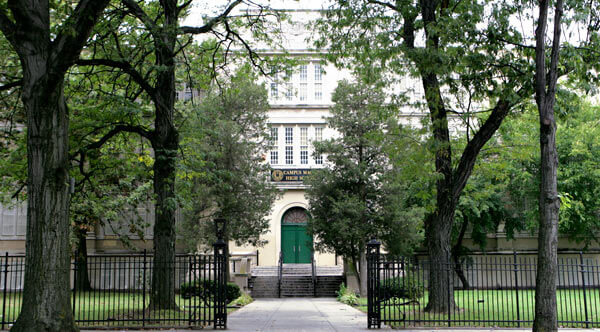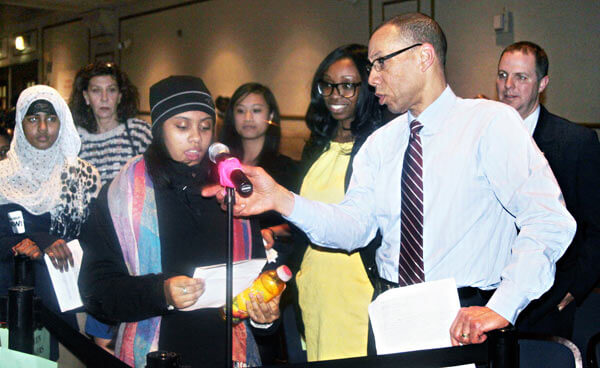By Rich Bockmann
The city early Thursday morning approved a slate of new-school openings and co-locations, including several in Queens.
The Panel for Educational Policy wrapped up approving every item on its agenda around 1 a.m. Thursday morning at the Prospect Heights high school campus in Brooklyn.
The panel, which is composed of a majority of mayoral appointees, approved proposals to open five new schools in Queens that will be housed in buildings already occupied by existing schools and also gave the green light to co-locate two charter schools.
Elected officials representing a handful of Queens schools slammed the panel prior to the vote. “The days are short. I and many others were elected to the Council because I emphatically oppose co-locations,” I. Daneek Miller, the frontrunner for southeast Queens’ city council District 27, said. “And that is the position we will bring to City Hall.”
Nearly 300 people — many of them grade school students — gathered inside and were deafeningly shouting at the panel before the meeting began. The public comment period lasted hours, packed with elected officials and concerned residents.
State Assemblywoman Catherine Nolan (D-Ridgewood) spoke against a proposal to co-locate a Career and Technical Education school within Long Island High School, adding that the current principal should be given a chance to move the school forward without city interference. Nolan said her district was not opposed to the idea that a CTE program could better the school, but argued it should be installed as a program under the current leadership.
One woman spoke against a plan to co-locate a Success Academy Charter School branch serving K-4 in the August Martin High School building, saying the school would be forced to move about $17 million in equipment to make way for the new programs.
The practice of co-locating two institutions in one building — usually charter schools or small schools with a thematic focus — has been central to Bloomberg’s efforts to reform struggling schools during 12 years of mayoral control.
Bloomberg has had some influential partners, particularly in his efforts to replace large schools with poor track records.
The small school movement began in the city under the Giuliani administration, but did not pick up steam until 2002. Bloomberg with the help of $31 million in financial support from the Bill and Melinda Gates Foundation Bloomberg then embarked on a large-scale effort to replace large, struggling institutions with smaller schools where teachers and administrators could provide students with more individualized attention.
Last week researchers at the Massachusetts Institute of Technology and Duke University released the most comprehensive study yet on small schools in New York City. While the experts said the jury is still out on the long-term impact of the smaller institutions, they did find that students who attended one of the new schools did better early on in college compared to their peers at bigger, traditional schools.
States and school districts across the country have also received incentives in the form of school improvement grants from the George W. Bush and Barack Obama administrations to turn around the lowest-performing schools. Last week, Obama stopped by Brooklyn to praise an innovative new high school the city wants to emulate in Queens.
The Pathways in Technology School, known as P-Tech, creates a public-private partnership among the DOE, IBM and the New York City College of Technology that offers students a high school diploma and an associate degree at no additional cost, along with a clear track to a lucrative job in the booming high-tech sector.
Opponents of Bloomberg’s policies argue that they are disruptive to existing schools. When it comes to co-locations, the incumbent schools lose funding based on the cuts made to their enrollments, and critics argue preference is given to the new schools when it comes to sharing common spaces such as gyms, libraries and cafeterias.
In the end, they say, the new schools are given support while the older ones are left to crumble until they can be shuttered.
The DOE has put forward comparatively tamer plans to restructure Queens schools that the PEP will consider at meetings in November and December before a new mayor takes office.
Reach reporter Rich Bockmann by e-mail at rbockmann@cnglocal.com or by phone at 718-260-4574.




































